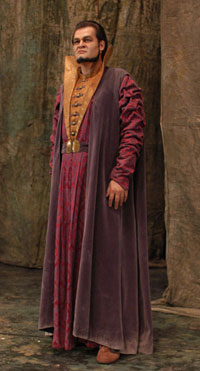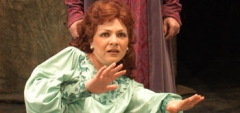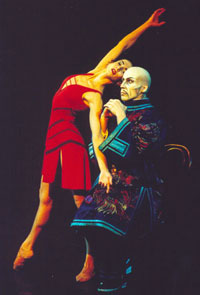
Hungarian National Opera and Ballet 2004

Hungarian National Opera and Ballet 2004

Juratsek
Hungarian National Opera and Ballet 2004
Hungarian National Opera and Ballet
with the Royal Ballet Sinfonia
conducted by Janós Kovács
Sadler's Wells Theatre
in a Bartók double-bill:
Bluebeard's Castle (one act opera)
The Miraculous Mandarin (one act ballet)
Hungarian National Opera and Ballet brings two of Bartók's greatest masterpieces to London for three performances in October. The ballet/opera double-bill of Bluebeard's Castle and The Miraculous Mandarin is presented as part of 'Magyar Magic', the year-long celebration of Hungarian arts to mark Hungary's entry into the European Union.
Bluebeards's Castle
Hungarian National Opera's fully-staged production of Bluebeard's Castle - Bartók's disturbing exposé of the dark secrets in Duke Bluebeard's past - features Péter Fried as Duke Bluebeard and Andrea Meláth as Judith, his wife.
Andrea Meláth trained at the Ferenc Liszt Academy of Music in Budapest, with Katalin Mátés. She is regularly featured in performances of the Hungarian State Opera in Budapest. Most recently she sang the role of Masha in Péter Eötvös's Three Sisters.
Péter Fried is a bass soloist at the Hungarian State Opera in Budapest. His roles have included Colline in Puccini's La Bohème, Ramphis in Verdi's Aida and Duke Bluebeard in Bartók's Bluebeard's Castle.
The Miraculous Mandarin
The Miraculous Mandarin was choreographed by Hungary's legendary choreographer Gyula Harangozó, who worked closely with the composer on its creation.
The ballet tells the melodramatic story of the mysterious Mandarin whose desire for a young prostitute triumphs over death and violence. Before its premiere, the ballet was banned by the Hungarian authorities.
Originally conceived in 1931, it was only in 1956 that The Miraculous Mandarin could be staged in its original form.
The Hungarian National Ballet, under the direction of the choreographer's son, Gyula Harangozó Jr., since 1966, brings its celebrated production to London.
Gyula Harangozó Sr (1908—1974), a theatre tailor’s son, watched the performances of the Hungarian Royal Opera from the wings, and began as an extra in the opera's ballet company. He was soon promoted to become a soloist, and his first choreography was staged in 1936.
During a scholarship in London, Harangozó became acquainted with the works of Léonide Massine and Michel Fokine as well as British mime traditions. Back in Hungary he turned to the music of Béla Bartók to create several versions of the Wooden Prince and Bluebeard’s castle. It is his 1956 choreography that is revived in this performance.



